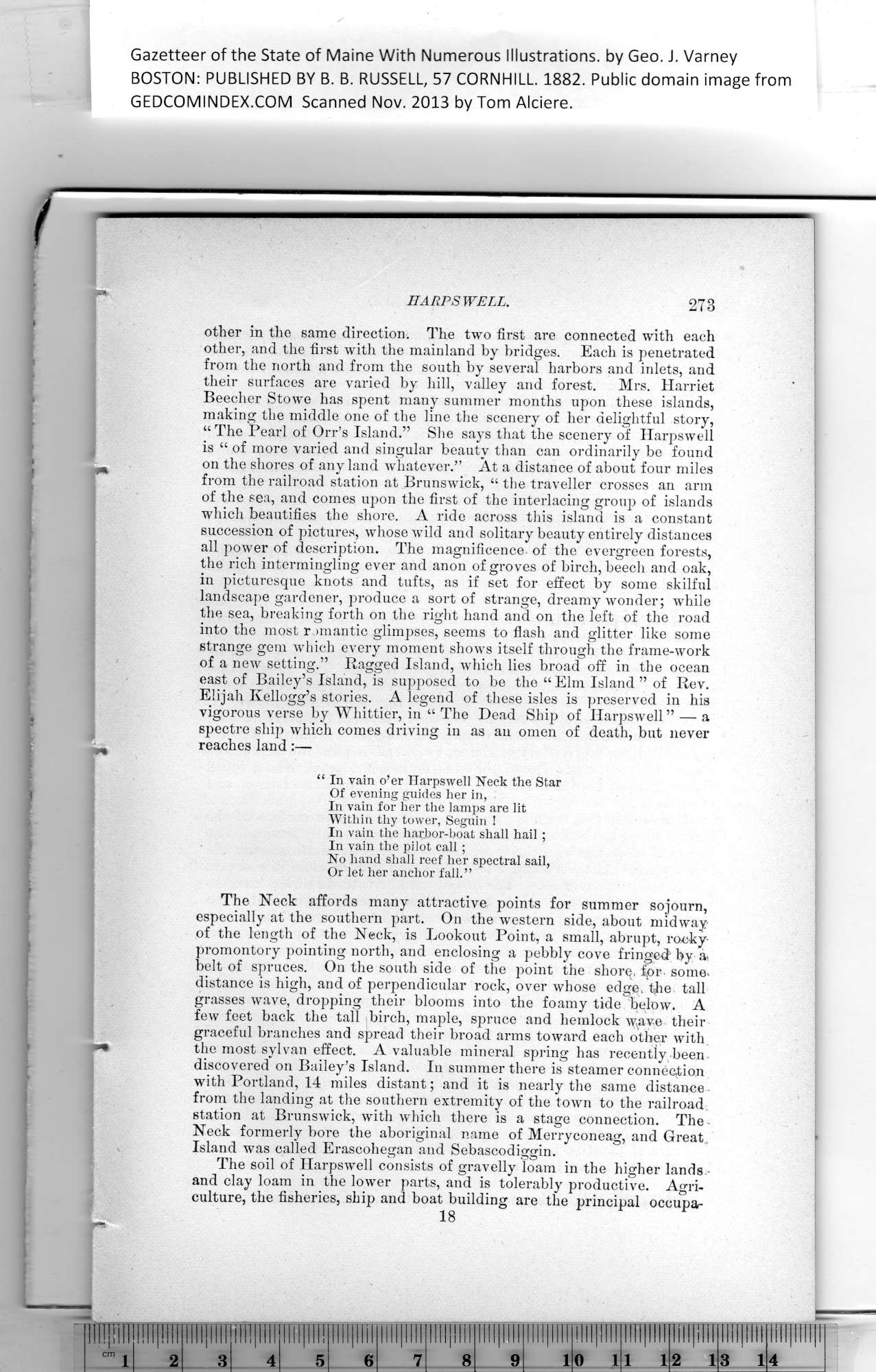|
Gazetteer of the State of Maine With Numerous Illustrations, by Geo. J. Varney
BOSTON: PUBLISHED BY B. B. RUSSELL, 57 CORNHILL. 1882. Public domain image from
HARPS WELL.
other in the same direction. The two first are connected with each
other, and the first with the mainland by bridges. Each is penetrated
from the north and from the south by several harbors and inlets, and
their surfaces are varied by hill, valley and forest. Mrs. Harriet
Beecher Stowe has spent many summer months upon these islands,
making the middle one of the line the scenery of her delightful story,
“ The Pearl of Orr’s Island.” She says that the scenery of Harpswell
is “ of more varied and singular beauty than can ordinarily be found
on the shores of any land whatever.” At a distance of about four miles
from the railroad station at Brunswick, “ the traveller crosses an arm
of the sea, and comes upon the first of the interlacing group of islands
which beautifies the shore. A ride across this island is a constant
succession of pictures, whose wild and solitary beauty entirely distances
all power of description. The magnificence of the evergreen forests,
the rich intermingling ever and anon of groves of birch, beech and oak,
in picturesque knots and tufts, as if set for effect by some skilful
landscape gardener, produce a sort of strange, dreamy wonder; while
the sea, breaking forth on the right hand and on the left of the road
into the most romantic glimpses, seems to flash and glitter like some
strange gem which every moment shows itself through the frame-work
of a new setting.” Ragged Island, which lies broad off in the ocean
east of Bailey’s Island, is supposed to be the “ Elm Island ” of Rev.
Elijah Kellogg’s stories. A legend of these isles is preserved in his
vigorous verse by Whittier, in “ The Dead Ship of Harpswell ” — a
spectre ship which comes driving in as an omen of death, blit never
reaches land:—
“ In vain o’er Harpswell Neck the Star
Of evening guides her in,
In vain for her the lamps are lit
Within thy tower, Seguin !
In vain the harbor-boat shall hail ;
In vain the pilot call ;
No hand shall reef her spectral sail,
Or let her anchor fall.”
The Neck affords many attractive points for summer sojourn,
especially at the southern part. On the western side, about midway
of the length of the Neck, is Lookout Point, a small, abrupt, rocky-
promontory pointing north, and enclosing a pebbly cove fringed by a>
belt of spruces. On the south side of the point the shorq, fpr- some-
distance is high, and of perpendicular rock, over whose edge, the- tall
grasses wave, dropping their blooms into the foamy tide below. A
few feet back the tall birch, maple, spruce and hemlock wave their
graceful branches and spread their broad arms toward each other with
the most sylvan effect. A valuable mineral spring has recently been.
discovered on Bailey’s Island. In summer there is steamer connection
with Portland, 14 miles distant; and it is nearly the same distance-
from the landing at the southern extremity of the town to the railroad
station at Brunswick, with which there is a stage connection. The-
Neck formerly bore the aboriginal name of Merryconeag, and Great,
Island was called Erascohegan and Sebascodiggin.
The soil of Harpswell consists of gravelly loam in the higher lands
and clay loam in the lower parts, and is tolerably productive. Agri-
culture, the fisheries, ship and boat building are the principal ocoupa-
18
PREVIOUS PAGE ... NEXT PAGE
This page was written in HTML using a program written in Python 3.2
|
